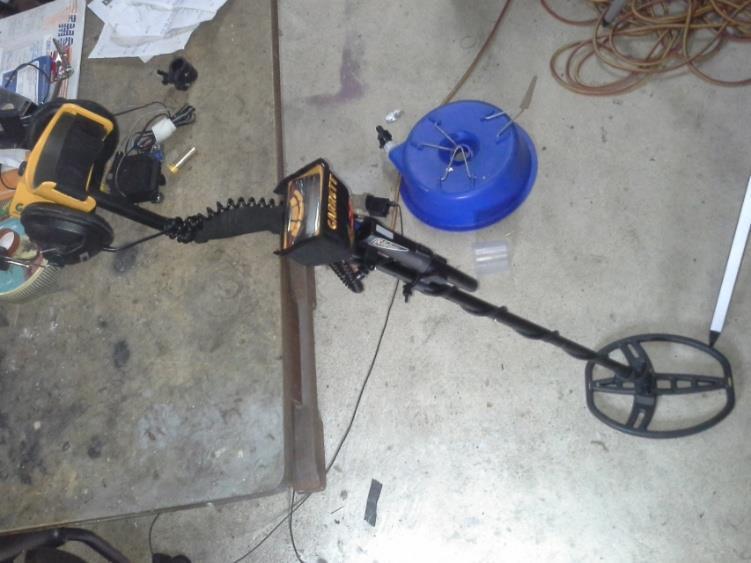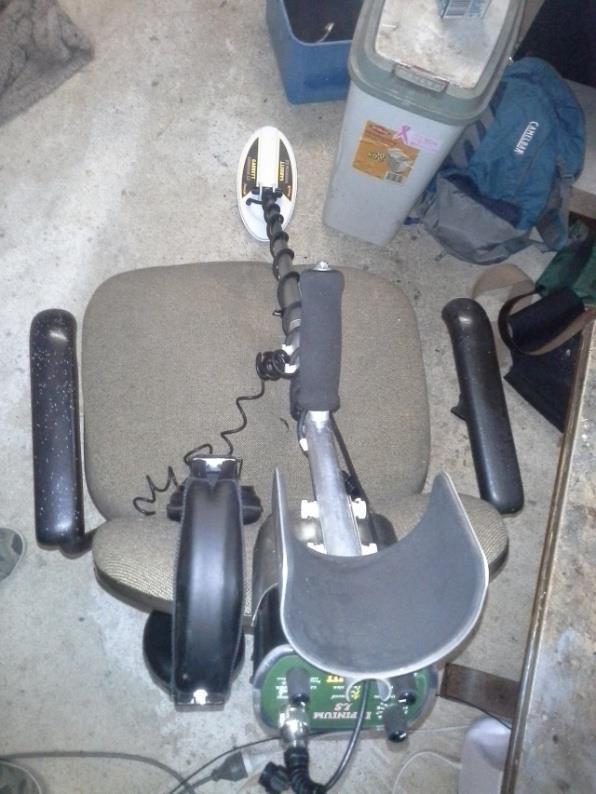Goldpick
Chris Johnson
Just having a bit of a thought about whether your personal detector really provides decent bang for your buck. Does buying a $2000 detector compared to a $300-500 detector give you 4 times the ability to pull good targets out of the ground, would you be happy with just 2 times the ability?
There is always the urge to upgrade, looking for that magical detector that will expose those hidden treasures better than the one before. How do you rate your favourite detector, and why do you think it offers good value for money. Has it delivered the results you expected, or have you found that finds have not necessarily increased dramatically after a hefty purchase.
Why I ask, is that people new to the scene always ask what is the best detector to buy for any given scenario, and I'm opening this to both new and superceded models. Many times we simply recommend the most expensive or what is thought to be the most capable detector available. When in reality it may be the number of hours spent behind the coil of a reasonably priced detector that dictates how well we can locate finds, whether it be coins, jewellery, relics or gold.
Can you honestly say that your detector has or will pay for itself (if looking valuables), or have you come to the realisation that you just have to take what you can get and just enjoy the great outdoors, afterall, not everyone is concerned about paying off their detector with their finds. (also think about all those accessory coils and gear you bought as well).
Were you happy to buy second hand, only to find that there was no real need to sell an arm or a leg to have success, or did you find buying a new model was the only way to become more successful? How long was the learning curve to allow you be a competant operator on your detector?
I think these are more realistic questions that newbies should probably ask, considering many have nil experience on detectors, netherlone know where to detect in the first place, or how recognise good targets. Whilst covering costs from detecting is always nice, it will also depend on many other factors like the immediate areas available for you to detect in, location, fuel used, time available and so on, so it may not be an achievable target for many.
Here's my two bobs worth:
Garrett Ace 250 - initial purchase price second hand was $250 with two coils, control box cover, charger with AA batteries, and headphones. Items of value found over the last year or two, $500+, rings and jewellery value not included.
Extra accessories bought, two coils approx $180.
Learning curve - easy to intermediate, depending on how you use the detector (discriminate mode or in "scan mode")
Main use - coinage and jewellery at parks and beaches.
Advantages - lightweight, excellent battery life, reliable, good discrimination as shallow to med depths, good range of coils, hot on modern coinage, especially in dry sand, cheap to buy second hand.
Disadvantages - slow recovery time, limited depth and discrimination capabilites with stock coils, no ground balance function, no true all metal mode, and dosen't like wet sand or mineralised ground.
Time spent on detector - 80% spent on the Ace, 20% on the Garrett Infinium, average of 3 times a week.

Garrett Infinium - bought for $750 second hand with 3 coils, charger, batteries, external powered speaker and headphones. Items of value found approx $150 in coinage plus unvalued jewellery, mainly silver.
Advantages - excellent depth on the beach, works well on wet/dry/in water, waterproof, reasonably lightweight, runs on 8 AA batteries which last for 2-3 all night hunts, coils reasonably cheap to purchase, works well in areas with EMI.
Disadvantages - PI detector, so you dig everything, including junk, fiddly coil and headphone connections that are prone to damage, relatively high maintenance costs, coils not of the highest quality. Goes nuts when batteries near exhausted.
Extra accessories bought - one coil, plus new headphones, around $200 worth.
Learning curve - med to high, not so bad once you work out the little niggles involved in maintaining this detector properly. Beach is relatively easy, dig everything including faint threshold peaks.
Time spent on detector - 20%, average of once a week or less, owned for two years.
Areas used - mainly beach detecting, probably only 3 times at local goldfields

So at the end of all that, financially I am not on top if you consider both detector purchases and accessories, but still on the way to partly covering my costs, and the initial outlay hasn't been huge. If I had not bought the infinium, I would have been better off financially, but I consider it a good learning experience for my first PI detector. Would I recomend the Ace as a cost effective detector - yes, the Infinium, probably not. But to be fair, my time on the Infinium has be limited in comparison, and with very little time spent on the goldfields.
There is always the urge to upgrade, looking for that magical detector that will expose those hidden treasures better than the one before. How do you rate your favourite detector, and why do you think it offers good value for money. Has it delivered the results you expected, or have you found that finds have not necessarily increased dramatically after a hefty purchase.
Why I ask, is that people new to the scene always ask what is the best detector to buy for any given scenario, and I'm opening this to both new and superceded models. Many times we simply recommend the most expensive or what is thought to be the most capable detector available. When in reality it may be the number of hours spent behind the coil of a reasonably priced detector that dictates how well we can locate finds, whether it be coins, jewellery, relics or gold.
Can you honestly say that your detector has or will pay for itself (if looking valuables), or have you come to the realisation that you just have to take what you can get and just enjoy the great outdoors, afterall, not everyone is concerned about paying off their detector with their finds. (also think about all those accessory coils and gear you bought as well).
Were you happy to buy second hand, only to find that there was no real need to sell an arm or a leg to have success, or did you find buying a new model was the only way to become more successful? How long was the learning curve to allow you be a competant operator on your detector?
I think these are more realistic questions that newbies should probably ask, considering many have nil experience on detectors, netherlone know where to detect in the first place, or how recognise good targets. Whilst covering costs from detecting is always nice, it will also depend on many other factors like the immediate areas available for you to detect in, location, fuel used, time available and so on, so it may not be an achievable target for many.
Here's my two bobs worth:
Garrett Ace 250 - initial purchase price second hand was $250 with two coils, control box cover, charger with AA batteries, and headphones. Items of value found over the last year or two, $500+, rings and jewellery value not included.
Extra accessories bought, two coils approx $180.
Learning curve - easy to intermediate, depending on how you use the detector (discriminate mode or in "scan mode")
Main use - coinage and jewellery at parks and beaches.
Advantages - lightweight, excellent battery life, reliable, good discrimination as shallow to med depths, good range of coils, hot on modern coinage, especially in dry sand, cheap to buy second hand.
Disadvantages - slow recovery time, limited depth and discrimination capabilites with stock coils, no ground balance function, no true all metal mode, and dosen't like wet sand or mineralised ground.
Time spent on detector - 80% spent on the Ace, 20% on the Garrett Infinium, average of 3 times a week.

Garrett Infinium - bought for $750 second hand with 3 coils, charger, batteries, external powered speaker and headphones. Items of value found approx $150 in coinage plus unvalued jewellery, mainly silver.
Advantages - excellent depth on the beach, works well on wet/dry/in water, waterproof, reasonably lightweight, runs on 8 AA batteries which last for 2-3 all night hunts, coils reasonably cheap to purchase, works well in areas with EMI.
Disadvantages - PI detector, so you dig everything, including junk, fiddly coil and headphone connections that are prone to damage, relatively high maintenance costs, coils not of the highest quality. Goes nuts when batteries near exhausted.
Extra accessories bought - one coil, plus new headphones, around $200 worth.
Learning curve - med to high, not so bad once you work out the little niggles involved in maintaining this detector properly. Beach is relatively easy, dig everything including faint threshold peaks.
Time spent on detector - 20%, average of once a week or less, owned for two years.
Areas used - mainly beach detecting, probably only 3 times at local goldfields

So at the end of all that, financially I am not on top if you consider both detector purchases and accessories, but still on the way to partly covering my costs, and the initial outlay hasn't been huge. If I had not bought the infinium, I would have been better off financially, but I consider it a good learning experience for my first PI detector. Would I recomend the Ace as a cost effective detector - yes, the Infinium, probably not. But to be fair, my time on the Infinium has be limited in comparison, and with very little time spent on the goldfields.



